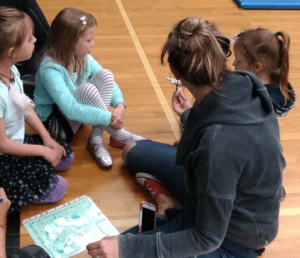3.2 Impromptu Conferences
 Asking affective questions of both the offender and those who have been harmed creates a small impromptu conference. This is the informal step you may choose if the circumstances do not call for a more formal structure, such as a restorative circle.
Asking affective questions of both the offender and those who have been harmed creates a small impromptu conference. This is the informal step you may choose if the circumstances do not call for a more formal structure, such as a restorative circle.
Informal restorative practices are appropriate when the incident has impacted only one or a few individuals, and is not considered a severe transgression. The teacher may be dealing with aberrant behavior that is recent and not yet seen as part of a pattern. For example, a first incident of teasing among young students may be a suitable case for less formal intervention.
It is important to follow a method similar to that used in more formal restorative practices, incorporating the following four steps:
- The offender has a chance to tell their side of the story and to take responsibility for their actions.
- The person (or persons) suffering harm is supported to explore the harm they experienced by talking about how they have been affected.
- The offender is given the opportunity to acknowledge the harm done, and may offer an apology.
- An agreement is made among the parties that includes a plan to monitor future behavior/incidents and follow-up.
Adapted from Restorative Practices and Bullying, (Thorsborne, 2017).
Impromptu conferences reduce the need for more time-consuming formal restorative practices. Systematic use of informal restorative practices has a cumulative impact and creates an environment that consistently fosters awareness, empathy and responsibility in a way that is likely to prove far more effective in achieving social discipline than reliance on punishment and sanctions (Wachtel, 2013).
